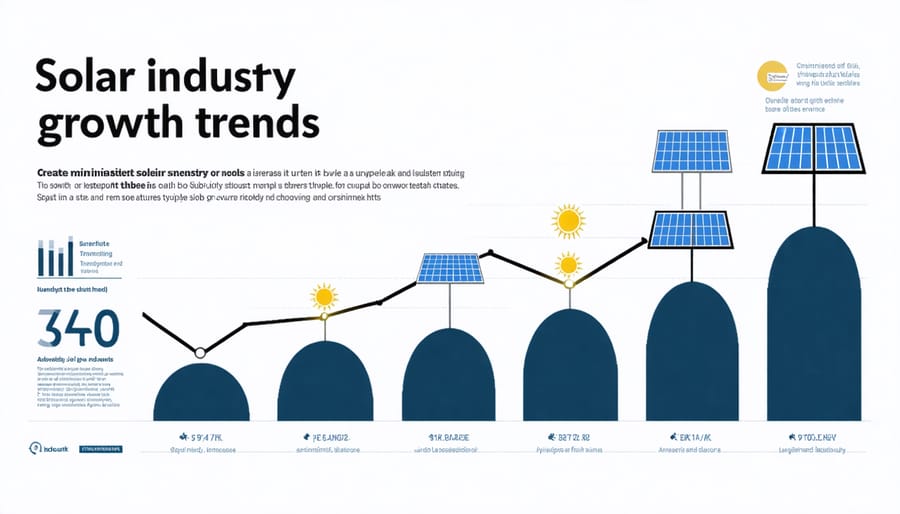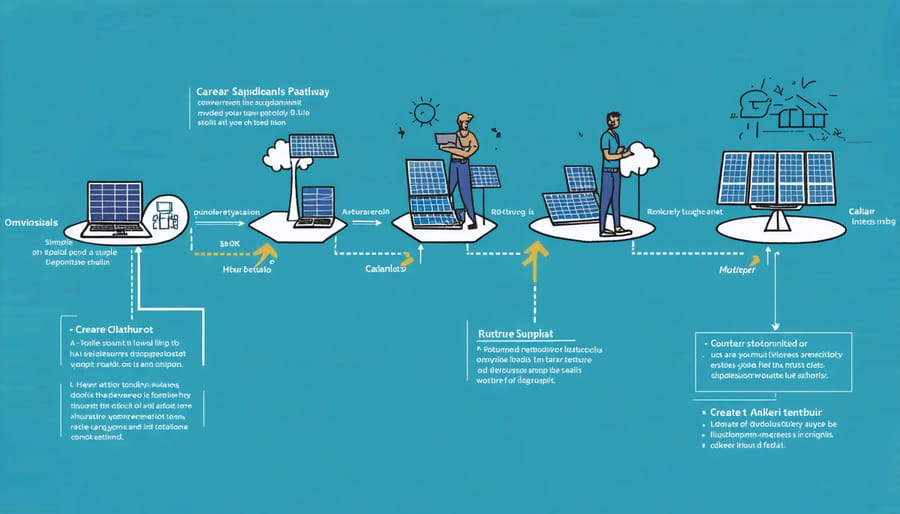The solar energy sector is experiencing unprecedented growth, creating a surge of career opportunities across the supply chain. From logistics coordinators managing equipment delivery to project managers overseeing large-scale installations, the industry offers diverse paths for both newcomers and experienced professionals. Recent data shows solar employment growing 167% faster than the overall U.S. economy, with median salaries ranging from $60,000 to over $130,000 for specialized roles.
Solar careers combine technological innovation with environmental impact, attracting professionals who want to make a difference while building a stable future. The field encompasses roles in manufacturing, distribution, installation, sales, and technical support, with opportunities for advancement as the industry continues to expand. Whether you’re a recent graduate, career changer, or seasoned professional, the solar sector offers clear pathways to success through certifications, specialized training, and hands-on experience.
This dynamic industry rewards both technical expertise and soft skills, making it accessible to professionals from various backgrounds while providing long-term job security in a growing market.
Why Solar Supply Chain Careers Are Taking Off
Industry Growth Statistics
The solar energy sector is experiencing unprecedented growth, with solar industry jobs expanding at a rate six times faster than the overall U.S. job market. According to the Solar Energy Industries Association (SEIA), employment in the solar sector has doubled in the past decade, now supporting over 250,000 American jobs. Industry projections suggest this number could reach 400,000 by 2030.
States like California, Texas, and Florida are leading the employment surge, with installation and sales positions showing particularly strong growth. The median salary for solar professionals ranges from $40,000 to $120,000 annually, depending on role and experience. Technical positions such as solar engineers and project managers command the highest salaries.
The industry’s rapid expansion is driven by decreasing installation costs, favorable government policies, and growing consumer demand for renewable energy solutions. This sustainable growth trajectory makes solar energy one of the most promising career fields for the next decade.

Job Security in Renewable Energy
The solar energy sector offers exceptional job security, backed by impressive industry growth and increasing global demand for renewable energy solutions. As solar technology continues revolutionizing home energy systems, professionals in this field enjoy stable, long-term career prospects. The U.S. Bureau of Labor Statistics projects solar installer jobs to grow by 27% through 2031, significantly faster than most occupations.
Career advancement opportunities are abundant, ranging from entry-level positions to senior management roles. Many solar professionals progress from installation or sales positions to project management, system design, or technical leadership roles. The industry’s consistent technological innovations and expanding market create new specializations regularly, offering diverse career paths for growth.
Additionally, solar energy jobs typically offer competitive salaries and benefits, reflecting the sector’s skilled workforce demands and essential role in the clean energy transition.
Key Roles in Solar Supply Chain Management
Procurement and Sourcing Specialists
Procurement and sourcing specialists play a vital role in the solar industry by managing supply chains and securing materials needed for solar installations. These professionals negotiate with suppliers, analyze market trends, and ensure quality control of components like solar panels, inverters, and mounting systems. They typically need a bachelor’s degree in supply chain management, business, or a related field, along with experience in procurement.
Key responsibilities include developing supplier relationships, maintaining inventory levels, coordinating deliveries, and optimizing costs while ensuring compliance with quality standards. Strong analytical skills, negotiation abilities, and knowledge of solar technology are essential. Many specialists earn professional certifications like CPSM (Certified Professional in Supply Management) to advance their careers.
The role offers competitive salaries and growth opportunities as the solar industry expands. Regular interaction with manufacturers, distributors, and project managers makes this position ideal for those who enjoy both technical and interpersonal aspects of supply chain management.
Inventory and Warehouse Management
The solar industry’s rapid growth has created exciting opportunities in inventory and warehouse management. These roles involve coordinating the storage and distribution of essential solar components, from panels to mounting hardware. Warehouse managers ensure proper handling of delicate equipment, maintain accurate inventory levels, and oversee shipping logistics to installation sites. The position requires strong organizational skills, knowledge of inventory management software, and an understanding of solar equipment handling protocols. Many professionals start as warehouse associates and advance to management positions through experience and additional certifications. Warehouse careers offer competitive salaries, stable employment, and the satisfaction of contributing to the renewable energy sector. The demand for skilled logistics professionals continues to grow as solar companies expand their operations nationwide.

Quality Control and Compliance
Quality control specialists in solar energy ensure that solar components and installations meet rigorous industry standards and safety requirements. These professionals typically need a background in engineering, quality assurance, or related technical fields. Daily responsibilities include inspecting solar panels and equipment, conducting performance tests, maintaining documentation, and ensuring compliance with local and federal regulations.
The role requires attention to detail, strong analytical skills, and knowledge of quality management systems. Many employers prefer candidates with certifications like the Certified Quality Inspector (CQI) or relevant solar certifications. Quality control positions offer competitive salaries and stable career growth, as the solar industry continues to prioritize reliability and safety standards.
Successful professionals in this field often advance to senior quality management positions or transition into consulting roles, making it an attractive long-term career path in the renewable energy sector.
Distribution and Transportation
The solar industry relies heavily on efficient distribution and transportation professionals to ensure panels, inverters, and equipment reach installation sites on time. Logistics coordinators and transportation managers play crucial roles in optimizing delivery routes, managing warehouse operations, and coordinating with suppliers and installers. These positions typically offer competitive salaries ranging from $45,000 to $75,000 annually, with opportunities for advancement into senior management roles.
Professionals in this field need strong organizational skills, knowledge of supply chain management, and familiarity with logistics software. Many companies prefer candidates with experience in renewable energy or construction logistics, though transferable skills from other industries are often valuable. As the solar industry continues to grow, the demand for skilled distribution professionals is expected to increase, making this an attractive career path for those interested in combining logistics expertise with sustainable energy.
Getting Started in Solar Supply Chain Management
Required Skills and Qualifications
To thrive in the solar energy industry, professionals typically need a combination of technical knowledge and soft skills. A bachelor’s degree in engineering, environmental science, or renewable energy is often required for technical positions, while business-related roles may accept degrees in business administration or related fields.
Technical skills needed include understanding of photovoltaic systems, electrical systems, and energy storage technologies. Proficiency in computer-aided design (CAD) software and project management tools is increasingly important. Safety knowledge and certification in OSHA standards are essential for field positions.
Strong analytical and problem-solving abilities are crucial, as is attention to detail when working with complex systems. Communication skills are vital for explaining technical concepts to customers and collaborating with team members. Physical stamina may be required for installation and maintenance roles.
Many employers value additional certifications such as the North American Board of Certified Energy Practitioners (NABCEP) certification. Knowledge of local building codes, electrical regulations, and renewable energy policies is also important. Experience with sustainability practices and green building standards can provide a competitive advantage in the field.
Industry Certifications
Several industry certifications can boost your career prospects in solar energy. The North American Board of Certified Energy Practitioners (NABCEP) certification is widely recognized as the gold standard, offering various specializations including PV Installation Professional and PV Design Specialist certifications. These credentials demonstrate your expertise and commitment to industry best practices.
The Solar Energy International (SEI) provides comprehensive training programs and professional certificates that are highly valued by employers. Their courses cover everything from basic solar principles to advanced system design and installation techniques.
For those interested in the technical aspects, the Electronics Technicians Association (ETA) offers the Photovoltaic Installer certification, which focuses on installation and maintenance skills. The Interstate Renewable Energy Council (IREC) also provides valuable credentials that validate your knowledge and capabilities in renewable energy.
Many community colleges and technical schools offer solar-specific programs that include hands-on training and often lead to certification. These programs typically take 6-12 months to complete and provide essential practical experience that employers seek.
Salary and Benefits Overview
Entry-Level to Executive Compensation
The solar energy sector offers attractive compensation packages across all experience levels. Entry-level installers and technicians typically start between $35,000 and $45,000 annually, with significant potential for growth through certifications and experience. Mid-level professionals, such as project managers and senior technicians, can expect to earn $60,000 to $85,000 per year.
For those advancing to management positions, salaries range from $90,000 to $120,000, while executive roles like directors of operations or chief sustainability officers can command $150,000 to $250,000+ annually. Many positions also include performance bonuses, health benefits, and stock options.
The industry’s rapid growth continues to drive competitive compensation, with additional perks like remote work options, continuing education support, and sustainability bonuses becoming increasingly common. Geographic location and company size significantly influence salary ranges, with metropolitan areas and larger corporations typically offering higher compensation packages.
Career Growth Potential
The solar energy sector offers exceptional career growth potential, with numerous advancement paths available as you gain experience. Entry-level installers can progress to team leaders, project managers, and eventually operations directors. Technical specialists often advance to system designers, master technicians, or engineering consultants. Sales representatives can move up to regional managers or directors of business development.
The industry’s rapid expansion creates opportunities for specialists to branch into related areas like energy storage, smart grid integration, and sustainable building design. Many professionals also transition into training roles, consulting positions, or start their own solar businesses. With the increasing demand for renewable energy solutions, solar professionals can expect steady career progression and competitive compensation packages.
Additionally, the emergence of new solar technologies and applications continually creates fresh opportunities for advancement, especially for those who stay current with industry developments and pursue relevant certifications.

The solar energy industry stands at the forefront of an exciting energy revolution, offering unprecedented career opportunities for those seeking meaningful and sustainable work. As global demand for renewable energy continues to surge, professionals in solar energy can expect strong job security, competitive salaries, and the satisfaction of contributing to a cleaner future. Industry projections suggest that solar jobs will grow at nearly five times the average rate of other sectors over the next decade.
Whether you’re interested in hands-on installation work, engineering design, project management, or sales and marketing, the solar industry provides diverse pathways for career growth and advancement. The field welcomes both experienced professionals transitioning from traditional energy sectors and newcomers starting their careers. With ongoing technological innovations and supportive government policies, the solar energy sector promises to remain a dynamic and rewarding career choice.
As we move toward a more sustainable future, professionals in solar energy will play a crucial role in shaping how we power our world. The combination of environmental impact, job stability, and opportunities for innovation makes a career in solar energy not just a job choice, but an investment in the future.









